Whether we think about the pandemic, recent technological shifts, or declining church attendance, we are in an era of societal changes that affect how we do ministry. In some ways, there is no roadmap for handling these changes; we will all have to experiment and learn as we go. In other ways, however, we have some idea of what is likely to happen and how best to deal with it. That’s where these books come in: to help us navigate the many changes around and ahead of us with grace.
. . . And the Church Actually Changed: Uncommon Wisdom for Pastors in an Age of Doubt, Division, and Decline
N. Graham Standish (Author)
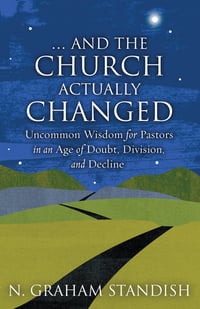 . . . And the Church Actually Changed: Uncommon Wisdom for Pastors in an Age of Doubt, Division, and Decline arises out of N. Graham Standish's work as a spiritual director and coach to clergy of all denominations and traditions. He draws on insights from counseling, spirituality and spiritual direction, organizational development, and other fields. Each chapter is built around a dialogue between a clergy coach and various clergy clients about significant clergy leadership issues.
. . . And the Church Actually Changed: Uncommon Wisdom for Pastors in an Age of Doubt, Division, and Decline arises out of N. Graham Standish's work as a spiritual director and coach to clergy of all denominations and traditions. He draws on insights from counseling, spirituality and spiritual direction, organizational development, and other fields. Each chapter is built around a dialogue between a clergy coach and various clergy clients about significant clergy leadership issues.
Turning Ourselves Inside Out: Thriving Christian Communities
Russell Daye (Author), Robert C. Fennell (Author)
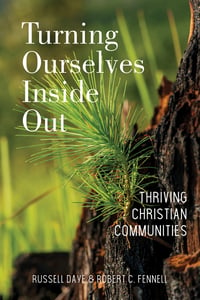 Turning Ourselves Inside Out emerges from the Thriving Christian Communities Project started by the authors in 2015. In interviews with thirty-five faith communities, the authors discovered that amid great upheaval, Christ is giving us a new church. This book invites readers to listen to others' experiences and then dig deep into their own and get down to the business of dreaming God's dream and making it real.
Turning Ourselves Inside Out emerges from the Thriving Christian Communities Project started by the authors in 2015. In interviews with thirty-five faith communities, the authors discovered that amid great upheaval, Christ is giving us a new church. This book invites readers to listen to others' experiences and then dig deep into their own and get down to the business of dreaming God's dream and making it real.
Managing Congregations in a Virtual Age
John W. Wimberly Jr. (Author)
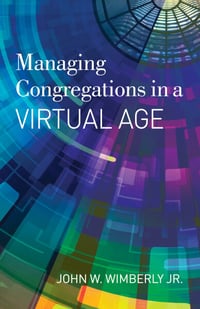 In Managing Congregations in a Virtual Age, John W. Wimberly Jr. draws on the experience of the business community, and on a diverse group of skilled pastors and rabbis, as he lays out the opportunities and challenges of working from home for congregations and staff, offering principles and best practices for successfully managing remote workers and ministries. This comprehensive guide will serve congregations well into the future, even as technology and circumstances change.
In Managing Congregations in a Virtual Age, John W. Wimberly Jr. draws on the experience of the business community, and on a diverse group of skilled pastors and rabbis, as he lays out the opportunities and challenges of working from home for congregations and staff, offering principles and best practices for successfully managing remote workers and ministries. This comprehensive guide will serve congregations well into the future, even as technology and circumstances change.
Grace and Gigabytes: Being Church in a Tech-Shaped Culture
Ryan M. Panzer (Author)
 Grace and Gigabytes explores the intersection of technology, culture, and church. Examining digital technology not as a set of tools, but as a force for cultural transformation, Ryan M. Panzer explores the networked values of the digital age—questions, connection, collaboration, and creativity; demonstrates the need for the church to change if it is to realize its mission; and makes recommendations for the practice of ministry today.
Grace and Gigabytes explores the intersection of technology, culture, and church. Examining digital technology not as a set of tools, but as a force for cultural transformation, Ryan M. Panzer explores the networked values of the digital age—questions, connection, collaboration, and creativity; demonstrates the need for the church to change if it is to realize its mission; and makes recommendations for the practice of ministry today.
Better Together, Expanded and Updated: Making Church Mergers Work
Jim Tomberlin (Author), Warren Bird (Author), Craig Groeschel (Foreword by)
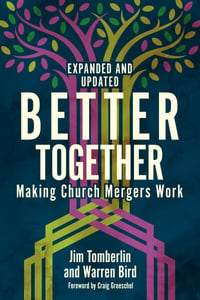 In Better Together, Expanded and Updated: Making Church Mergers Work, church merger consultant Jim Tomberlin and award-winning writer Warren Bird provide a complete, practical, hands-on guide for church leaders of both struggling and vibrant churches, so they can understand the issues, develop strategies, and execute mergers for church expansion and renewal—ultimately, so they can reinvigorate declining churches and create a thriving new entity.
In Better Together, Expanded and Updated: Making Church Mergers Work, church merger consultant Jim Tomberlin and award-winning writer Warren Bird provide a complete, practical, hands-on guide for church leaders of both struggling and vibrant churches, so they can understand the issues, develop strategies, and execute mergers for church expansion and renewal—ultimately, so they can reinvigorate declining churches and create a thriving new entity.
The Missional Leader: Equipping Your Church to Reach a Changing World
Alan J. Roxburgh (Author), Fred Romanuk (Author), Eddie Gibbs (Foreword by)
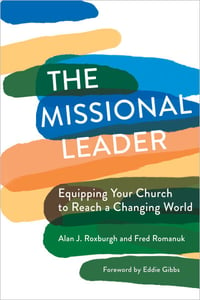 In The Missional Leader, consultants Alan J. Roxburgh and Fred Romanuk give church and denominational leaders a clear model for leading the change necessary to foster a missional church focused outward to spread the message of the gospel into the surrounding community. The Missional Leader emphasizes principles rather than institutional forms, shows readers how to move from "church as usual," and demonstrates what capacities, environments, and mindsets are required to lead a missional church.
In The Missional Leader, consultants Alan J. Roxburgh and Fred Romanuk give church and denominational leaders a clear model for leading the change necessary to foster a missional church focused outward to spread the message of the gospel into the surrounding community. The Missional Leader emphasizes principles rather than institutional forms, shows readers how to move from "church as usual," and demonstrates what capacities, environments, and mindsets are required to lead a missional church.
Mission Rift: Leading through Church Conflict
David E. Woolverton (Author)
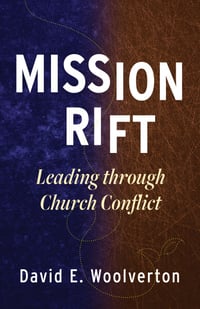 In Mission Rift, David E. Woolverton reorients our view of congregational conflict. In part 1, he examines conflict from a theological and ecclesiological framework, exploring why it may be essential to discipleship and mission. In part 2, he presents six principles of missional leadership, challenging pastors and other leaders to create environments that use conflict as a tool to facilitate growth and empower a congregation's witness within the community and beyond.
In Mission Rift, David E. Woolverton reorients our view of congregational conflict. In part 1, he examines conflict from a theological and ecclesiological framework, exploring why it may be essential to discipleship and mission. In part 2, he presents six principles of missional leadership, challenging pastors and other leaders to create environments that use conflict as a tool to facilitate growth and empower a congregation's witness within the community and beyond.
